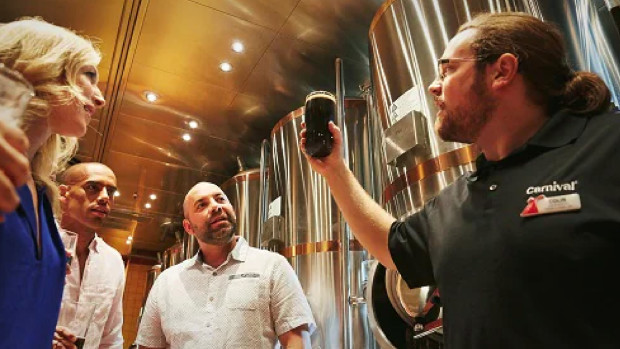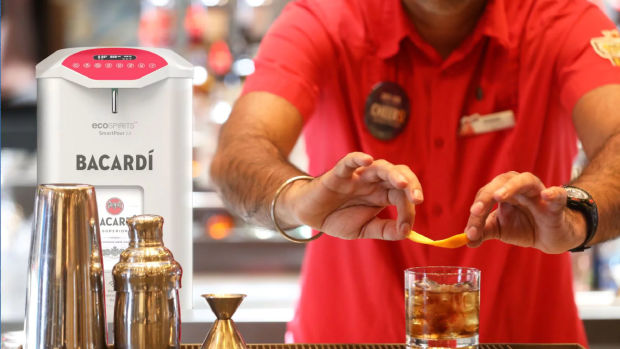
Usually, when a cruise line makes a change, passengers don't like it. Sometimes that's justified because the replacement often does not equal what used to be offered.
That was pretty much universally the reaction when Carnival Cruise Line (CCL) -), Royal Caribbean, MSC, and Norwegian Cruise Line all separately opted to eliminate plastic straws. It's not that the cruise lines' customers wanted to pollute, it's just that paper straws don't work as well as what they're replacing.
DON'T MISS: Carnival Cruise Line makes a clear statement on 'mandatory' tips
The same logic has applied to various attempts by Royal Caribbean (RCL) -) to eliminate plastic water bottles. On some ships, the cruise line has offered water in aluminum cans rather than bottles. That may be better for the planet, but passengers complained largely because they believe that water doesn't taste as good when it comes from a can.
That's the fine line the cruise lines have to walk when it comes to environmental efforts. Passengers ostensibly support those efforts, but they become less supportive when their paper straw melts in their drink.
Nobody's vacation gets impacted when Royal Caribbean, Carnival, and MSC add more ships powered by environmentally friendly liquefied natural gas (LNG). They might even feel good about their vacation being a little more "green."
The cruise line's latest effort involves its beverage program, but it's not related to bottled water or plastic straws. Instead, the cruise line is testing a major change to its liquor bottles.

Image source: Carnival Cruise Lines
Carnival tests reusable liquor bottles
Unless you're drinking vintage liquors or top-shelf options, you probably give very little thought to the bottle your liquor comes in. Some liquors, like Jim Beam and Jack Daniels, can be purchased in both glass and plastic bottles.
On a cruise ship, liquor gets poured from single-use glass bottles. That creates a lot of waste and Carnival has a plan – working with Bacardi and what the cruise line described as "innovative circular economy technology company ecoSpirits."
The program will bring reusable bottles to select Carnival cruise ships
"The pilot will determine if re-usable containers developed by ecoSpirits can be used to serve Bacardi rum on Carnival ships, in turn reducing single-use packaging by 95%. The concept is being tested for three months on three ships operating from Miami: Carnival Celebration, Carnival Horizon, and Carnival Sunrise," according to Carnival
EcoSpirits has created a specialized version of its patent-pending closed-loop glass packaging format, the ecoTote 3.0SC Cruise Edition, specifically for the maritime environment. "Each ecoTote replaces approximately four bottles of Bacardi Superior rum and each one is used, cleaned, and refilled approximately 100 times, thereby creating a closed loop system," the cruise line shared.
Carnival is creative about recycling
A donation will be made by ecoSpirits for every ecoTote it sells to Carnival that will pay for the removal of more than two pounds of single-use plastic, glass, and other man-made wastes from endangered marine environments.
Carnival recycles single-use glass items. Every ship in the fleet is outfitted with a recycling center, where crew members sort paper, plastic, and glass recyclables. In addition, the cruise line added "food digesters" across its entire fleet in 2022.
"A bio-digester is an enclosed container converting food waste into liquid at an accelerated rate – breaking down 99% of the food put into it, with only a fine, silt-like material remaining. By utilizing beneficial microorganisms, plus oxygen and warm water, digesters can process anything that can be consumed by a human," the cruise line shared.
On Mardi Gras, one of Carnival's flagships, 14 food digesters can process about 142,000 pounds of food waste each week. Processing the waste onboard reduces stress on the waste removal infrastructure in port cities and limits what the cruise line discharges into the ocean.
"Without bio-digesters, millions of pounds of unprocessed food waste would otherwise be lawfully discharged into the ocean as allowed by maritime law. Current maritime regulations do not require food waste to be processed and only prohibit discharge at sea within 12 nautical miles from land," Carnival added.







